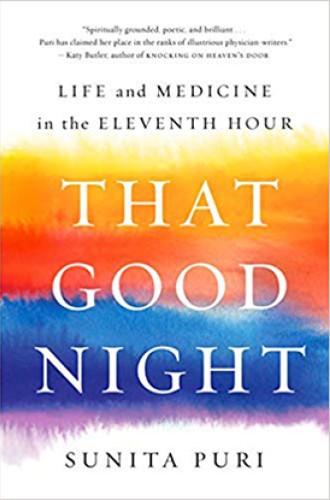A palliative care physician writes about the mystery of faith
Sunita Puri’s memoir models the kind of compassion and wisdom she brings to her patients.
When I worked in an academic medical center’s intensive care unit, I watched people with diverse belief systems, ethnicities, and social locations struggle to make decisions that felt ethical and loving in the face of the harsh and uncertain realities of illness. Often, it seemed to me that patients and their families were rooting these decisions in various combinations of logic, emotion, and guesswork. At the time, the hospital had only one nurse focused on palliative care, a branch of medicine that treats symptoms like trouble sleeping and shortness of breath even when the disease causing them is incurable. The discipline has expanded widely in the last decade. Now most hospitals have at least one palliative care physician.
Sunita Puri’s luminous, lyrical memoir is a literary introduction to the work of palliative care. She combines vivid detail with profound reflection to give insight into the experiences that unfold between medical staff, patients, and families near the end of life, particularly around medical decision making.
Many health-care practitioners are aware that patients bring their faith, their family, their emotional wounds, their fears, and the dynamics of their family systems into their experiences of illness. When medical professionals cannot grasp the complexity of their patients’ lives, Puri writes, they find their decisions unreasonable, and communication breaks down. “There is no freeway between the mind and the heart; a statement of medical facts does not lead to acceptance.”
Like most palliative care physicians, Puri had to learn to reject modern medicine’s “hidden curriculum,” which considers death a failure in a medical system that makes aggressive treatment economically profitable even when it will probably fail. Her stories show the high emotional price families pay when they fail to acknowledge the limitations of human life and medical technology. She tells of anguished siblings letting go of loved ones at early ages, and she recounts watching elderly people try to close out their lives with dignity and grace.
In addition to being a memoir about medicine, this book is also a moving meditation on the many influences that make us who we are and shape the lives we are compelled to live. Puri explores how her identity as the daughter of immigrants, her mother’s work as a physician, and her parents’ Hindu faith (which she doesn’t accept as her own) have shaped her worldview. She discusses how difficult it is for some physicians to develop a sense of home since their training often requires them to move repeatedly, from medical school to residency to fellowship to first position.
Puri is astute without being saccharine. She acknowledges that the long hours her mother devoted to medicine made her unable to be as present as Puri wished when she was growing up. She talks about her struggle with an eating disorder. She shows how these stories became woven into her capacity to understand patients, shaping how she practices medicine.
Although Puri doesn’t consider herself religious, she writes movingly about how her experiences have helped her think about the meaning of faith:
Maybe this is what faith is all about—having a way to accept and endure the most incomprehensible things that happen to us. Having faith didn’t have to mean subscribing to a certain set of religious beliefs or praying to a deity. . . . Maybe it meant surrendering the complete control we assume we have over our lives, and instead opening to the idea that another force, benevolent and mysterious looked after us.
Puri joins the circle of articulate physician-writers who movingly portray the wonders and limits of modern medicine and the emotional, physical, and spiritual sacrifices individuals make to practice medicine well. She admits, as any honest health-care provider should, that patients sometimes anger us, break our hearts, and move us deeply. Her desire to understand even the most frustrating patients is a model for others to emulate. Her reflections on the mysteries of life testify to her wisdom and compassion. Her stories, combined with her sense that we’re guided by a benevolent force beyond comprehension, point toward love’s power and life’s fragility.





